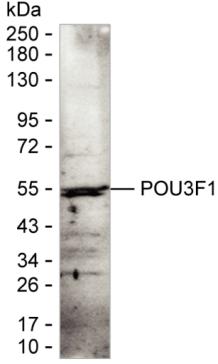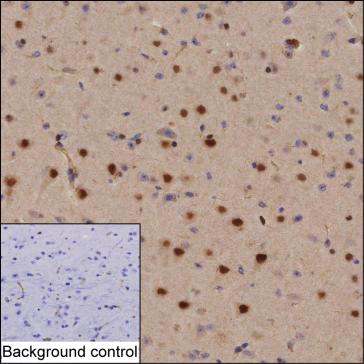

| WB | 1/500-1/1000 | Human,Mouse,Rat |
| IF | 1/20 | Human,Mouse,Rat |
| IHC | 1/50-1/100 | Human,Mouse,Rat |
| ICC | 技术咨询 | Human,Mouse,Rat |
| FCM | 咨询技术 | Human,Mouse,Rat |
| Elisa | 咨询技术 | Human,Mouse,Rat |
| Host/Isotype | Mouse IgG1 |
| Antibody Type | Primary antibody |
| Storage | Store at 4°C short term. Aliquot and store at -20°C long term. Avoid freeze/thaw cycles. |
| Species Reactivity | Mouse, Rat |
| Immunogen | Purified recombinant fragment of mouse Pou3f1 |
| Formulation | Purified antibody in PBS with 0.05% sodium azide |
+ +
以下是3-4篇关于RKIP(Raf激酶抑制蛋白)抗体的关键文献摘要,按研究领域分类整理:
---
1. **文献名称**:*"RKIP suppresses breast cancer metastasis through regulation of MAPK signaling"*
**作者**:Keller, E. T. et al.
**摘要**:研究揭示了RKIP通过抑制MAPK信号通路抑制乳腺癌转移的机制,并验证了特异性RKIP抗体在检测肿瘤组织中的表达水平及其与预后的相关性。
2. **文献名称**:*"Loss of RKIP expression is a prognostic marker in human cancers"*
**作者**:Beviglia, L. et al.
**摘要**:通过免疫组化分析(使用RKIP抗体),证明RKIP在多种癌症中表达下调,其缺失与患者生存率降低显著相关,提示其作为肿瘤抑制因子的潜在价值。
3. **文献名称**:*"RKIP regulates NF-κB activity by interacting with upstream signaling components"*
**作者**:Rosner, M. R. et al.
**摘要**:利用RKIP特异性抗体进行蛋白质互作实验,发现RKIP通过调控NF-κB信号通路影响炎症反应和肿瘤发生,为靶向治疗提供了新方向。
4. **文献名称**:*"RKIP modulates apoptosis and chemoresistance in cancer cells"*
**作者**:Yeung, K. C. et al.
**摘要**:研究通过Western blot(基于RKIP抗体)和功能实验,证明RKIP过表达可增强化疗药物诱导的癌细胞凋亡,提示其作为化疗增敏剂的潜力。
---
**备注**:以上文献为领域内代表性研究,实际引用时请核对具体期刊名称、年份及完整作者列表(例如Keller和Yeung团队有相关高被引论文)。建议通过PubMed或Web of Science以“RKIP antibody”或“Raf kinase inhibitor protein”为关键词进一步检索最新进展。
**Background of RKIP Antibody**
RKIP (Raf Kinase Inhibitor Protein), also known as PEBP1. is a conserved cytosolic protein initially identified as a modulator of the Raf-1/MEK/ERK signaling cascade. It functions by binding to and inhibiting Raf-1 kinase, thereby regulating cell proliferation, differentiation, and apoptosis. Beyond its role in MAPK signaling, RKIP interacts with diverse pathways, including NF-κB and G-protein-coupled receptor (GPCR) networks, highlighting its broad regulatory influence.
In cancer, RKIP acts as a metastasis suppressor by inhibiting epithelial-mesenchymal transition (EMT) and angiogenesis. Reduced RKIP expression correlates with tumor progression and poor prognosis, making it a biomarker of interest. RKIP antibodies are essential tools for detecting RKIP levels in tissues or cell lysates via techniques like Western blotting, immunohistochemistry, and immunofluorescence. These antibodies aid in studying RKIP’s role in disease mechanisms and therapeutic responses.
Additionally, RKIP is implicated in neurological disorders, such as Alzheimer’s disease, where it interacts with Tau phosphorylation pathways. The development and validation of specific, high-affinity RKIP antibodies remain critical for advancing research into its multifaceted biological functions and translational applications.
×